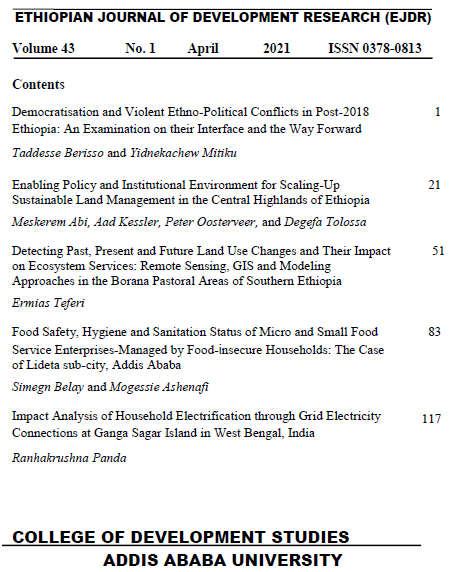Food safety, Hygiene and Sanitation Status of Micro and Small Food Service Enterprises Managed by Food-Insecure Households: The Case of Lideta Sub-City, Addis Ababa
Keywords:
Knowledge, Attitude, Practice, Food Safety, Food Security, WASH, Micro and Small EnterpriseAbstract
Food processing and food service are among the sectors organized under micro and small enterprise (MSE). MSE beneficiaries are organized in groups and sell ready-to-eat foods to customers. This prompted the study to assess the food security status of beneficiary households and evaluate food safety practices in food handling and related issues. MSE food handlers in woredas 1, 3, 4, 5, and 10 of Lideta Sub-City, Addis Ababa were purposively considered for this study and respondents were randomly and proportionally selected from the woredas. Data was collected from 255 beneficiaries using questionnaires and analysed by descriptive statistics. Chi-square was used to test significance of association. The majority (76%) of MSE food handlers were female. About 74% of respondents had primary or secondary education, 64% had a monthly income of ETB 2000 or less, and 22% were considered food secure. Mildly, moderately or severely food insecure respondents made up 45%, 27%, or 6%, respectively. The total food handling knowledge, attitude, and practice (KAP) of MSE food handlers were about 78%, 95% and 21%, respectively. The total personal hygiene KAP were about 23%, 97%, 22%, respectively. Water sanitation KAP were about 1 4%, 100% and 75%, respectively. Solid waste was taken away from the neighbourhood twice a week (96%). Only less than half admitted that the toilets around the food service sheds were clean. A few (about 6%) said that there were no toilets at all or, if present, were not functional. About 51% of handwashing facilities had soap and water on them. Generally, the results showed poor knowledge and practice of food handling, personal hygiene and water sanitation, although positive attitude towards improved food safety practice was high. Poor hygiene and sanitary conditions of food handlers in MSE can contribute to outbreaks of foodborne illnesses that may contribute to loss of customers, which, in turn, might worsen the food insecurity status of MSE beneficiaries

